
Keeping time with Clockwise
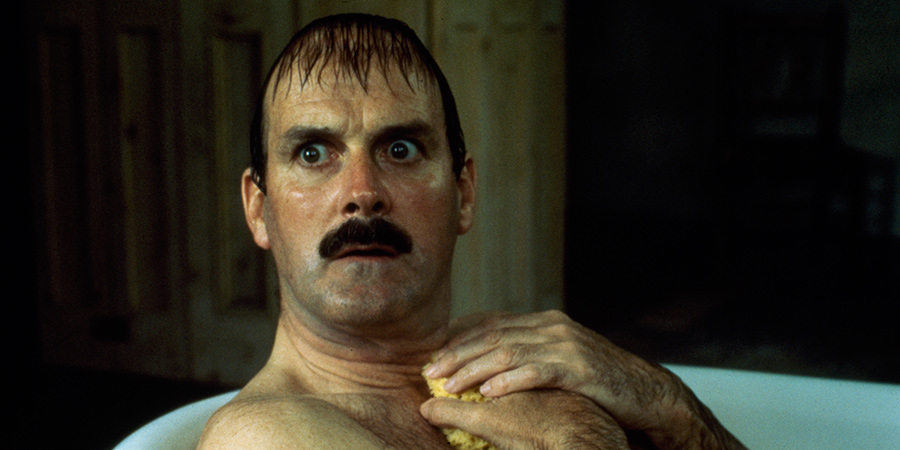
Back in March 1986, a poster appeared across the billboards of the land, advertising the forthcoming release of a new film. The poster featured a single image: a tall, moustached man sitting bolt upright in a bath. The man's expression suggested he was in a state of high alert as if he had just heard something troubling in the distance. The movie was Clockwise and the man in the bath was recognisably the already famous John Cleese, appearing in his first-ever cinematic leading role. Three years later, the same picture was used on the inside pages of the final Radio Times of the decade to promote the same film's network TV debut on BBC One, on Christmas Day 1989.
Clockwise sees Cleese playing Brian Stimpson, a man obsessed with time and punctuality. Although it is later revealed that Stimpson himself was regularly late and disorganised as a younger man, in middle-age he has evolved into a creature of military rigour and planning, living every second of his life with every task and action accounted for and timed with the utmost precision. This matters because Stimpson has risen to become the lauded headmaster of an apparently thriving state comprehensive, running the school along the same meticulous lines as the rest of his life. There are centrally-controlled clocks everywhere and Stimpson prints out all his schedules and timetables with the aid of his BBC Microcomputer. By the standards of 1986, he is in fact (no pun intended) way ahead of his time. The school, incidentally, is named appropriately enough after Thomas Tompson, the 17th and 18th Century mechanician, today renowned as "the Father of English Clockmaking". Menzies High School in West Bromwich was, in fact, used as the location for the film's early school-based scenes.
But Stimpson's control freakery extends way beyond obsessive timekeeping. He can, in fact, view much of the school from what is effectively a control tower, barking orders across a public address system when he spots any pupil wandering around the grounds looking lost, running late or generally engaged in any other illicit activity. Like many teachers, he possesses the remarkable ability to identify any one of his many pupils instantly. Cleese had little trouble adopting the authoritative guise of a teacher, having played such roles many times previously, for example, as a master who has sex with his wife as part of a practical demonstration during a sex education class in Monty Python's The Meaning Of Life (1983).
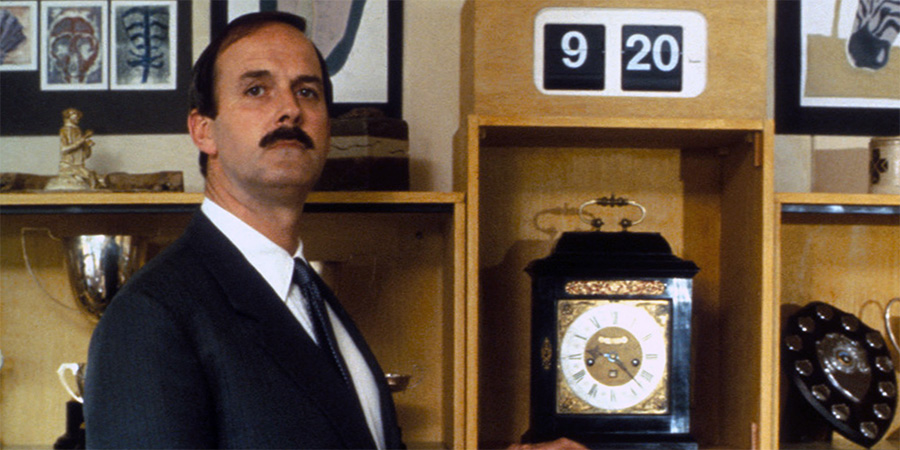
We join Brian Stimpson on what should be the day of his greatest triumph: he has just been elected to chair the annual Headmaster's Conference being held in Norwich. He is, in fact, the first ever comprehensive school headmaster to receive this honour. Today is the day he is set to embark for the event and open its first session with a prestigious keynote speech. But it is not too much to reveal that Stimpson's journey does not end up going smoothly: what should be the best day of his life and the towering moment of his career ends up spiralling quickly into disaster as he gets later and later for the conference. Events escalate to such an extent that his life is never likely to be the same again.
You would expect any film with a premise such as this to spend the initial opening scenes establishing how terrible the pedantic clock-watching tyrant Brian Stimpson really is and how he makes the lives of everyone around him a misery. This is essentially the story of Stimpson's downfall, after all; a process which will surely be a more enjoyable if we think of him as an annoying, malevolent bastard who deserves everything unfortunate that happens to him.
But this isn't what happens. For director Christopher Morahan and writer Michael Frayn decide to depict Stimpson as a sympathetic figure, at least at the film's start. From the outset, he comes across as generally likeable. He makes jokes in assembly which the children genuinely laugh at. He is also keen to include them in the successes which have led him be appointed to chair the conference. Even the fact that he occasionally hints at political ambitions is not used against him.
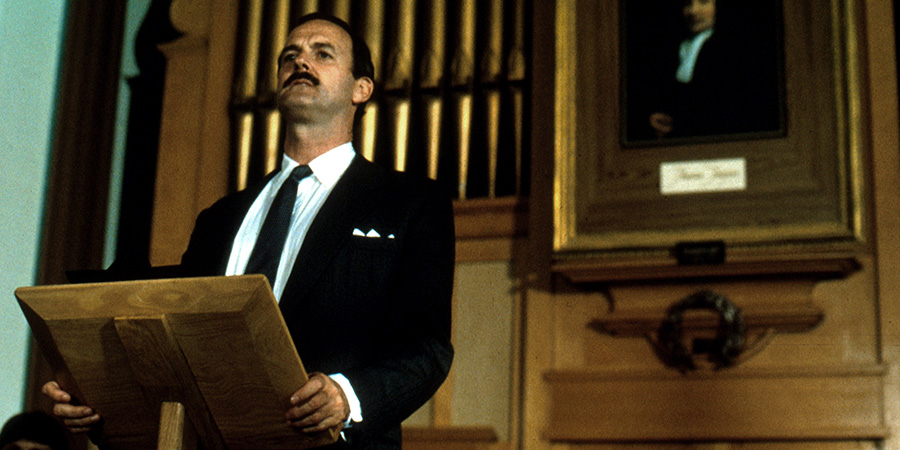
"You can all feel rather proud of yourselves," he declares, in announcing the news of his success during assembly. "Because they don't let just any old headmaster into the Headmaster's Conference, far from it...The Headmaster's Conference is the organisation to which all the great independent schools of this country belong, places like Eton and Harrow, Winchester and Westminster. The fee-paying schools. The 'posh' schools that we all look down our noses at, and that we'd all send our children to if only we'd got the money. They don't usually let in headmasters of common-or-garden comprehensive schools, of schools like this one...They let me in because you and I, all of us together, have made Thomas Tompson one of the best schools in the country... a well-run, orderly school..."
Clearly, Stimpson is not quite the leftist firebrand some of his teaching staff are. "Slay 'em at the conference, Brian!" urges one teacher (Howard Lloyd-Lewis). "Tell all those upper-class ponces we're gonna hang 'em from the lamp post by their old school ties!"
It is nevertheless generous of Stimpson to include his pupils in his success in this way, particularly as there are abundant signs that the school's orderly appearance may only be skin deep, with students smuggling pornographic magazines onto the playground and another boy actively streaking during lessons.
Things quickly go wrong for Stimpson as he sets off on what should be a perfectly straightforward journey to Norwich. After being dropped off at the railway station by his wife, Gwenda (a generally underutilised Alison Steadman), he proceeds to get on the wrong train. He does, at least, manage to get off before it leaves - unlike most people this happens to - but still misses the correct one. Getting a later train apparently not being an option, he attempts unsuccessfully to locate his wife. Mrs. Stimpson is, in fact, now busy with her charity work, namely escorting three very old ladies around town. As all three are clearly suffering from dementia, it seems likely these scenes would be handled differently today, but the performances from veteran actresses Joan Hickson, Ann Way and Constance Chapman are nevertheless excellent with Hickson (already appearing in her most famous role on TV at this point as Miss Marple) particularly memorable as Mrs. Trellis, who is hell-bent on delivering a seemingly interminable monologue about sherry glasses.
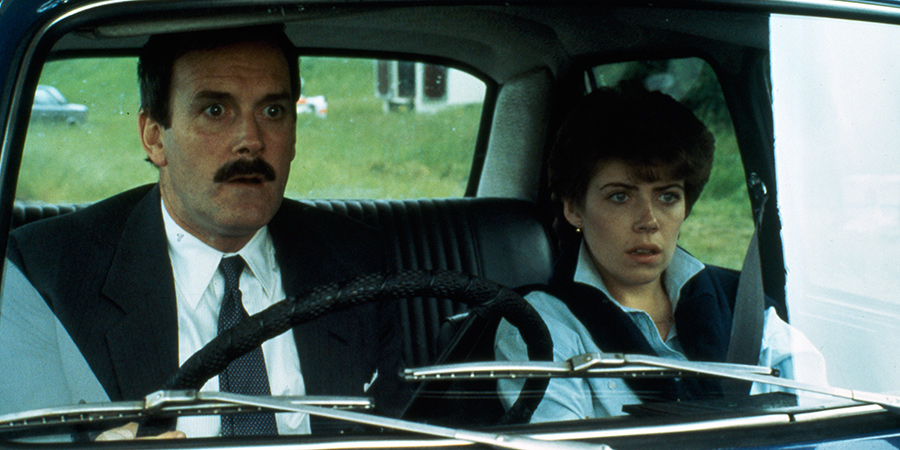
Unable to find his wife, Stimpson soon runs into Sixth Former Laura Wisely (Sharon Maiden), half-persuading and half-coercing her to drive him to Norwich. This in itself ends up complicating things as when Gwenda spies the two together outside a petrol station, she assumes they are having an affair. In fact, this idea is never really developed, and Laura is later revealed to be having a fling with music teacher, Mr. Jolly, a man so timid he literally barely finishes a complete sentence of dialogue during the entire film (for example, "I'll just go and get a cup of..."). Jolly is played marvellously by the late Stephen Moore, who was at the time best known for playing the father of teenage diarist Adrian Mole on ITV.
Events escalate dramatically. First, Brian and Laura forget to pay for their petrol. Then, Stimpson runs into Pat, an old flame from his days at teaching college and ends up forcing her to take over as drive. Pat is brought vividly to life by Penelope Wilton, now perhaps most recognisable from Shaun Of The Dead, Downton Abbey and After Life, but then best known for playing Ann, the long-suffering wife of Martin in the sitcom Ever Decreasing Circles.
There has never been a film version of Fawlty Towers. With this in mind, it's probably worth asking at this point: is Clockwise the next best thing? Even allowing for the fact that Brian Stimpson is a fundamentally different character from Fawlty, the answer to this question would ultimately have to be "yes". Stimpson is more organised than Fawlty, less snobby and unlike him is doing a job he seems well-suited to. On the other hand, Cleese's physical appearance had changed very little from his days as Basil by this point and he replicates much of Fawlty's trademark physicality; frantic running around, exasperated impatience and flying into spectacular fits of impotent rage. We even get to see Stimpson experience a Fawlty-esque bout of car trouble as the trio's vehicle gets completely stuck in mud. This scene seems tailor-made to provoke a feeling of déjà vu within the viewer. Even the car (a Morris 1100) is almost identical to the one used in the famous car-thrashing scene in Fawlty Towers (an Austin 1100 Countryman) a decade earlier. Both, in fact, are variants of the hugely well-selling BMC ADO16.

The poster image with Cleese in the bath, incidentally, turns out to be something of a red herring: the scene certainly occurs, but it has nothing much to do with the main story and certainly isn't typical of the film as a whole. Whilst he gets some occasional respite, Stimpson's day just gets worse as the charge sheet of offences he is accused of extends to robbery, car theft, vandalism and attempted kidnapping.
The world has changed since 1986. Rows of red public telephone boxes cannot be found in rural villages today. Indeed, much of the film's plot today would not work in the 21st Century simply because of the existence of mobile phones. This development has made life a lot easier for the Brian Stimpsons of this world while at the same time making it harder for anyone wanting to write screenplays about them. Some aspects of the film, in fact, seem quite old-fashioned even for the mid-eighties, perhaps a reflection that director Christopher Morahan and writer Michael Frayn were both then well into their fifties. Stimpson's arrival at a full-blown, functioning monastery in the middle does seem unusual, for example. "Of course, I'm in a monastery," Cleese muses on his arrival. "I might have guessed."
As the creator of the hugely popular 1982 theatre farce Noises Off, Frayn was, and still is, a very successful author and playwright. Given the extent to which the film feels like a vehicle tailor-made for John Cleese, it is rather a surprise to learn that the film wasn't written with him in mind at all. "I had always wanted to write something about a man who is late because I have considerable problems in relation to that myself, and only get places early by enormous expenditure of psychic energy," Frayn has said. "No one will believe it, but I didn't have an idea for casting."
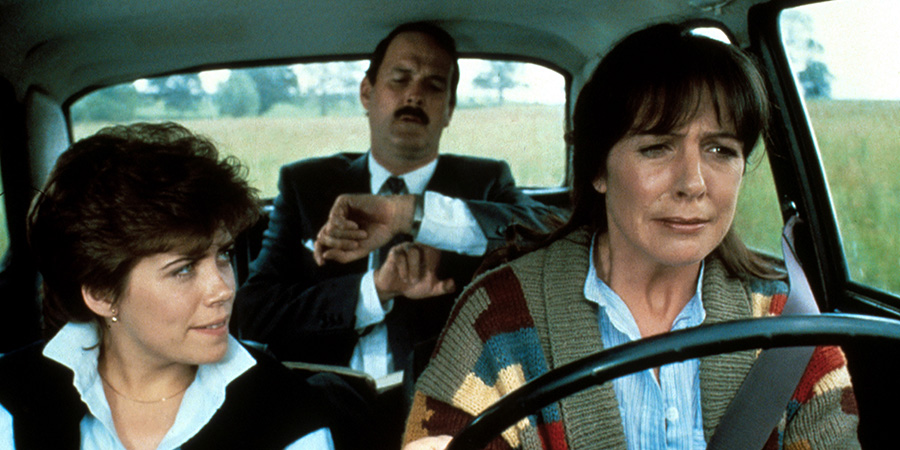
With this in mind, it is interesting to imagine how another actor might have managed in the role. Perhaps Leonard Rossiter or Peter Cook if it were a slightly older production, or Rowan Atkinson or Richard Wilson if it had been made later. As it was, Cleese loved the script. "Stimpson is a victim of circumstance," he said. "As the pressures increase, his behaviour becomes more and more erratic. Comedy is about things always going wrong, and that's just what happens to him. When you first see him, he's in charge. But as events take over and he can't cope - that's when he falls apart." Frayn originally wanted to call the film Man Of The Moment, but was persuaded to change it after someone pointed out it had the same title as a 1955 Norman Wisdom hit.
Director Christopher Morahan was then best known for his work on TV, while Doctor Who boss Verity Lambert served as a producer. Clockwise does admittedly have something of a small screen feel about it, a feeling enhanced by the fact that virtually every speaking part in the film is filled by someone now recognisable from late 20th Century television. For example, in addition to Cleese himself, at least three other actors from Fawlty Towers appear: notably, the great character actor Geoffrey Palmer (a conference delegate), along with the aforementioned Ann Way and Pat Keen (who plays Laura's mum). Quite coincidentally, there are also at least three major future Albert Square residents here: John Bardon (later Jim Branning in EastEnders) plays an unhelpful British Rail guard, Leslie Schofield (Jeff Healy in the soap) plays one of the film's many policemen, and Nadia Sawalha, here credited as Nadia Carina, makes her screen debut as Mandy, a girl playing truant who Stimpson briefly reprimands at the railway station.
Benjamin Whitrow (a leading headmaster here, but later best known as Mr Bennet in Pride And Prejudice), Michael Aldridge (a Prior in the monastery but also the pompous Seymour in Last Of The Summer Wine), Tony Haygarth (an unhelpful farmer), Peter Cellier (another headmaster), Geoffrey Hutchings (Laura's father) and Nick Stringer (a policeman) are all amongst the many other familiar faces that anyone who watched British television during the Eighties and Nineties should recognise.
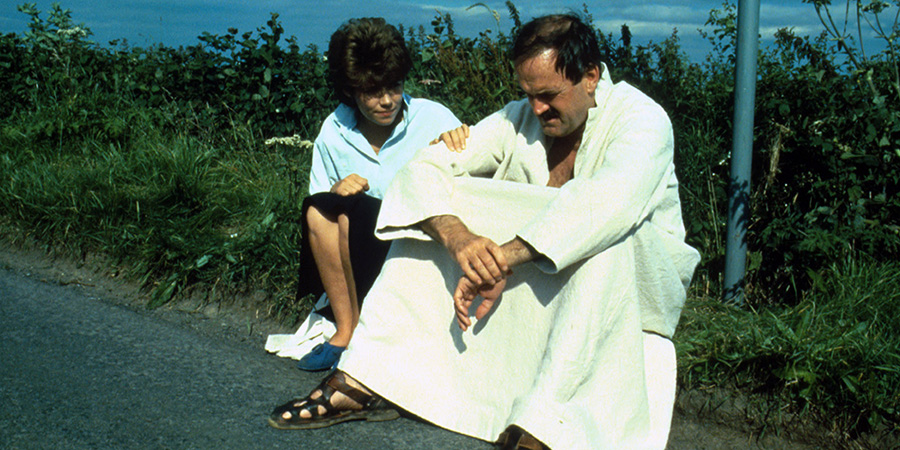
It would probably not be unfair to say that Clockwise didn't change the world to any dramatic degree. One line delivered by Cleese, however, has proven to have had a lasting resonance. "It's not the despair, Laura," Stimpson says during one particular low ebb. "I can stand the despair. It's the hope." The line has often been quoted in various forms and mediums since, often misquoted as "It's the hope I can't stand".
On 7th January 1986, fellow Python Michael Palin joined Cleese at a special screening of the new film at a cinema in London's Golden Square. Sat with a group of friends including Eric Idle and Terry Jones, his verdict, written in his diary, was not uncritical:
"Starts promisingly, even though many of the jokes are sub-Fawlty - including, amazingly enough, kicking and hitting a car that won't go," Palin observed. "Eventually the level of laughs begins to drop as the situation becomes more familiar and some LE [low energy?] casting, music and direction fail to lift it to the level that JC's performance merits. He comes in well ahead of the field with Frayn second and Morahan plodding along way back. Too safe by half."
Afterwards, Cleese joined them. Plain concludes: "Sensible, generous, but critical. John, far from being put off, listens intently and agrees wholeheartedly that the ending does peter out - with no satisfactory resolution."
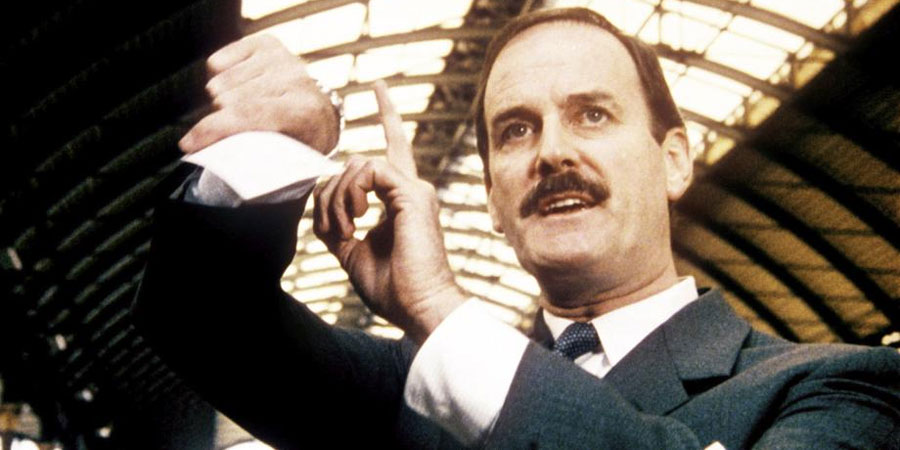
Ultimately, Clockwise was a minor hit in the UK and remains generally well-liked today. Indeed, Cleese won the 1986 Peter Sellers Award for Comedy at the London Evening Standard British Film Awards for his performance (Palin had won the same prize a year earlier). But Clockwise did no business at all in the USA. Michael Frayn resumed his successful career as a playwright and novelist, and time, as Stimpson himself may have observed, continued its relentless march onward into the future much as before.
However, something was stirring in that Soho cinema on that cold January day.
As Palin recalled: "Just before I leave, JC takes me on one side and asks, almost apologetically, if I mind him writing a part for me in his next film. He says it's a four-hander. Me, Kevin Kline, John, Jamie Lee Curtis!"
A Fish Called Wanda would prove to be a massive hit two years later.
Help us publish more great content by becoming a BCG Supporter. You'll be backing our mission to champion, celebrate and promote British comedy in all its forms: past, present and future.
We understand times are tough, but if you believe in the power of laughter we'd be honoured to have you join us. Advertising doesn't cover our costs, so every single donation matters and is put to good use. Thank you.
Love comedy? Find out moreClockwise

Featuring a tour-de-force performance from John Cleese in full Basil Fawlty mode, audiences have the opportunity to experience this lesson in the art of comic timing in high-definition for the very first time. For this new 2019 restoration of the madcap comedy classic, STUDIOCANAL has returned to the original colour negative. The scanning, restoration and grading of the negative was performed in 4K.
With a razor-sharp screenplay by acclaimed author and playwright Michael Frayn (Noises Off, Copenhagen) and great supporting turns from Alison Steadman, Penelope Wilton and Joan Hickson, Clockwise is the film that inspired Cleese to make A Fish Called Wanda and remains a much treasured British comedy classic to this day.
Cleese plays Mr Stimpson, a clock watching headmaster obsessed with timekeeping. When he boards the wrong train on his way to a headmasters' conference, however, his obsessive punctuality is put to the test. Turning back to find alternative means of transport, he hijacks one of his pupils - who is taking the afternoon off school - in her father's car. As the journey descends into further chaos, the head quickly begins to lose his schoolmasterly poise...
First released: Monday 18th November 2019
- Distributor: STUDIOCANAL
- Region: B
- Discs: 1
- Minutes: 91
![]() Buy and sell old and new items
Buy and sell old and new items
Search for this product on eBay
BCG may earn commission on sales generated through the links above.
- Distributor: STUDIOCANAL
- Region: 2
- Discs: 1
- Minutes: 87
![]() Buy and sell old and new items
Buy and sell old and new items
Search for this product on eBay
BCG may earn commission on sales generated through the links above.

